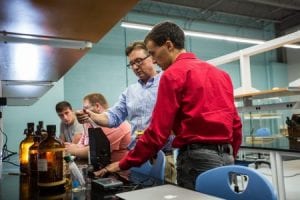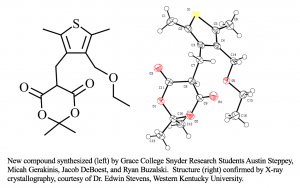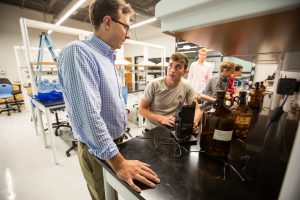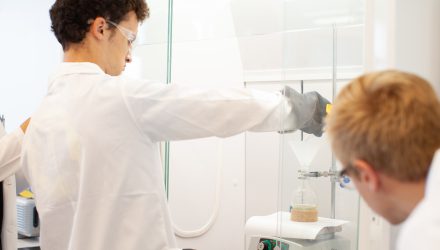
Overcoming Challenges, Creating New Molecules

There is something innate in the human story in which challenge leads to discovery. Sometimes, that challenge is based on need. Other times, it is simply the push to achieve more. No matter the reason, we as a people enjoy the thought of succeeding when others assume success is out of reach.
In fact, when one person decides to ask, ‘Why not me?’ and ‘Why not now?’, they achieve some of the most rewarding accomplishments. Recently that person was Dr. Chad Snyder, Director of Chemical Research at Grace College, and four of his students. Jacob DeBoest, Micah Gerakinis, Austin Steppey, and Ryan Buzalski synthesized a new organic molecule.1
 Some of you read that last paragraph and wondered why that would be a big deal. Others had your eyes glaze over at the introduction of a few scientific terms. Spoiler alert: there is more scientific terminology ahead. But we’ll do our best to keep everyone on the same page.
Some of you read that last paragraph and wondered why that would be a big deal. Others had your eyes glaze over at the introduction of a few scientific terms. Spoiler alert: there is more scientific terminology ahead. But we’ll do our best to keep everyone on the same page.
Understanding the Process
Do you recall the science projects from your middle and high school days? Chances are you remember how the science classrooms smelled. Blame it on the jars of formaldehyde if you wish, but they were unlike the other classrooms. Besides the chemicals stored there, you were also taught about the special equipment. Now imagine that, except on the college level. And now imagine trying to carry out scientific research without the equipment.
Because the Science Complex has undergone renovations, that was the challenge faced by Dr. Snyder and his team. Relocated to another building across campus, they decided to test the reactivity of one of the ring structures that appears in the molecule. They did this by taking the molecule and testing it with several different alcohols.
Partnerships, Processes, and Publication
Once the reaction occurred, they took the solution and recrystallized it. When this process is done properly, it produces several crystals of various sizes. Taking a sample, they sent them to Western Kentucky University. Here the crystals underwent several more tests, including X-Ray Crystallography. This analysis verified the structure of their new organic molecule.
The scientific method being what it is, they will now repeat the entire process, sending more samples for testing. They will also take the molecule and continue testing its reactivity with other chemicals. They are hopeful to create even more molecules. A research paper will also be written and submitted for publication.2
There is also an international chemical database where the team will submit this information for verification. Once verified, their new molecule will be added to the database. This is similar to registering a new star or comet once they are discovered.
Trust the Process
 Dr. Snyder was quick to offer superlatives about his students. “They did this without the equipment and tools we normally have in our Science Center. A new compound is difficult to make.” He added that even succeeding in the verification process is an impressive feat.
Dr. Snyder was quick to offer superlatives about his students. “They did this without the equipment and tools we normally have in our Science Center. A new compound is difficult to make.” He added that even succeeding in the verification process is an impressive feat.
Austin Steppey, one of the students, admitted that waiting was the most challenging aspect. When one of the collaborators testing the molecule had trouble with their own equipment, it lengthened that part of the process. But all the challenges were overcome and the reward is being realized. Jacob DeBoest echoed some of Austin’s thoughts when he said the most rewarding aspect of the process was working together. Their futures are unique, but they came together and worked in a spirit of unity on this project.
The Process is the Project
Students in various fields at Grace College understand that the process by which they complete projects is in itself the point. They work alongside faculty who are also practitioners. This means their education is not simply a classroom exercise that has no real-world application.
This is key to the academic process, which is a component of Grace ensuring educational excellence. If it will be done in your career, you can experience it in our classroom. The education is experiential and hands-on. If you would like to learn more about how Grace College can prepare you with a meaningful degree, click below.
1The molecule’s technical name is 4-Ethoxy-3-methyl(2,2-dimethyl-1,3-dioxane-4,6-dione)-2,5-dimethylthiophene.
2We have no doubt you will be riveted, if in fact you are riveted by all things scientific.
Previous Post

